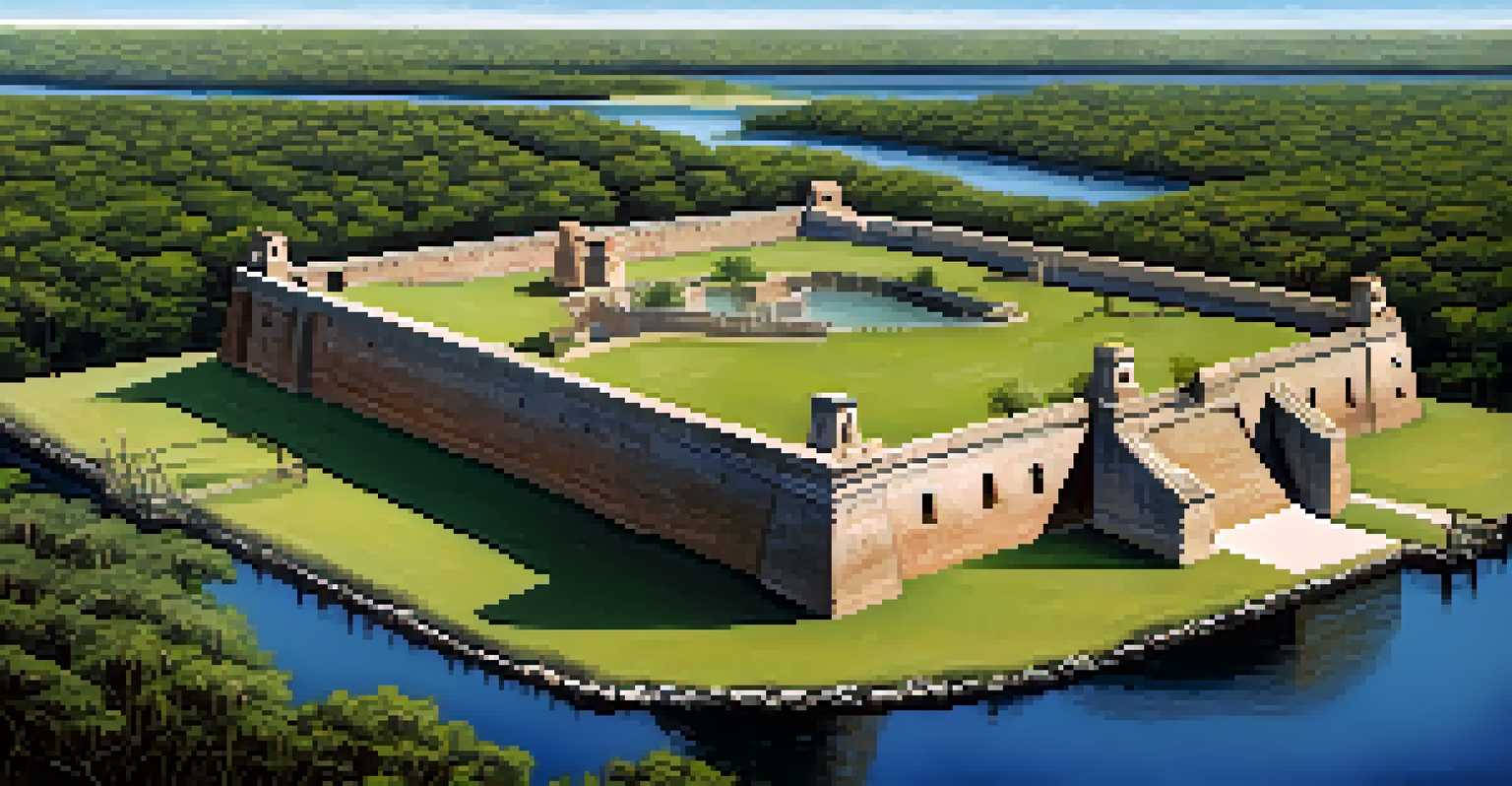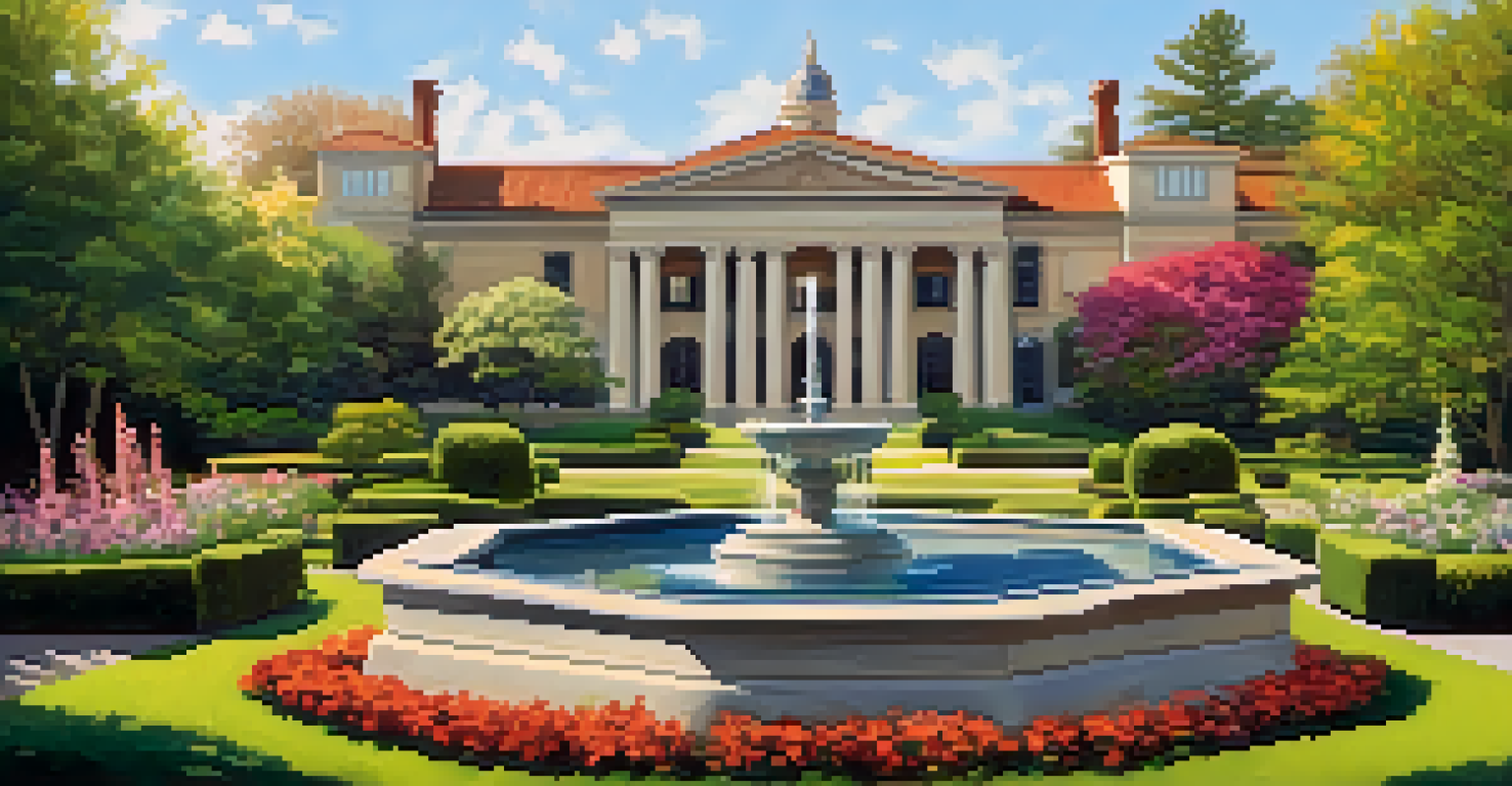The History and Importance of Jacksonville's Historic Sites

Introduction to Jacksonville's Historic Significance
Jacksonville, Florida, is not just a coastal city; it's a tapestry of history and culture. With roots tracing back to indigenous communities and later European settlements, Jacksonville has seen waves of change. As one of the largest cities in the U.S., its historic sites tell stories of resilience and transformation. Recognizing these sites helps us appreciate the city's unique identity.
History is not a burden on the memory but an illumination of the soul.
From the bustling downtown area to the serene waterfront, each historic site offers a glimpse into the past. They serve as reminders of the events that shaped Jacksonville and the people who walked its streets. As we explore these locations, we uncover not just the city's history, but also the narratives of the individuals who contributed to its development.
In this article, we will journey through some of Jacksonville's most significant historic sites, examining their importance and the stories they hold. Each section will highlight a specific location, revealing how it contributes to our understanding of Jacksonville's rich heritage.
Fort Caroline: A Glimpse into Early Colonial History
Fort Caroline, established by the French in 1564, is one of the earliest European settlements in North America. This site stands as a testament to the region's complex colonial history, marked by the struggle for control between European powers. Today, it offers visitors a chance to explore reconstructed structures and learn about the early settlers' lives.

The fort's location near the St. Johns River was strategic for trade and defense. Although the settlement was short-lived, its legacy continues to influence Jacksonville's cultural narrative. By visiting Fort Caroline, you can step back in time and experience the challenges and triumphs faced by those early colonists.
Jacksonville's Rich Historical Tapestry
The city's historic sites reflect its diverse cultural heritage and the stories of the individuals who shaped its development.
In addition to its historical significance, Fort Caroline is surrounded by beautiful natural landscapes. The site is part of the Timucuan Ecological and Historic Preserve, providing a perfect blend of history and nature for visitors to enjoy.
The Cummer Museum of Art and Gardens: Art Meets History
The Cummer Museum of Art and Gardens is a unique fusion of art, history, and nature in Jacksonville. Established in 1961, it houses an impressive collection of European and American artworks alongside stunning botanical gardens. The museum occupies the historic Cummer family estate, linking it directly to the city's affluent past.
The more you know about your history, the more liberated you are.
Visitors can stroll through the gardens, which feature beautiful fountains and lush landscaping, providing a serene escape in the heart of the city. The connection between art and history at the Cummer is palpable, as each exhibit tells a story of cultural evolution. It's a place where the past is celebrated and preserved, making it an essential stop for anyone interested in Jacksonville's heritage.
The museum also hosts various events and educational programs, enhancing community engagement with art and history. By visiting the Cummer, you not only appreciate the beauty of art but also gain insight into the stories that shaped Jacksonville.
Kingsley Plantation: A Window into Plantation Life
Kingsley Plantation, located on Fort George Island, offers a poignant look into the lives of enslaved people and plantation owners in the 19th century. As Florida's oldest plantation house, it serves as a critical site for understanding the complexities of American history. The preserved structures and surrounding grounds evoke a sense of the past and invite reflection on the difficult narratives of slavery.
Visitors can explore the ruins of the slave quarters, which provide a stark contrast to the grandeur of the main house. This juxtaposition highlights the stark realities of plantation life and the struggles of those who lived there. The site encourages conversations about heritage, resilience, and the impact of history on contemporary society.
Preserving the Past for the Future
Community efforts and historical organizations are essential in maintaining Jacksonville's historic sites, ensuring that their narratives are honored and shared.
Kingsley Plantation is more than just a historical site; it is a space for education and remembrance. By visiting, you can engage with the stories of the past and reflect on their significance in today's world.
The Florida Theatre: A Cultural Landmark
The Florida Theatre, built in 1927, is a stunning example of historic architecture and a cornerstone of Jacksonville's cultural scene. Originally designed as a movie palace, this theater has hosted countless performances, from concerts to ballets. Its beautifully restored interiors transport visitors back to a time when cinema was a grand event.
Beyond its aesthetic appeal, the Florida Theatre plays a vital role in preserving Jacksonville's artistic heritage. It showcases local talent and attracts national acts, making it a hub for creativity and entertainment. The theater's continued relevance speaks volumes about the city's dedication to maintaining its cultural institutions.
Attending a show at the Florida Theatre is not just about the performance; it's an experience steeped in history. Each event allows audiences to connect with the past while enjoying contemporary art, making it a cherished venue in the community.
The Jacksonville Landing: A Historic Waterfront Hub
The Jacksonville Landing, though no longer standing, was once a vibrant hub for locals and tourists alike. This waterfront marketplace opened in 1987 and became synonymous with Jacksonville's social scene. It featured restaurants, shops, and entertainment, all with a beautiful view of the St. Johns River.
While the Landing has faced challenges over the years, its legacy as a gathering place remains strong. It was a site for community events, festivals, and celebrations that brought people together, creating lasting memories. The spirit of the Landing lives on in the hearts of those who frequented it, reminding us of the importance of public spaces in fostering community connections.
Engaging with Local Heritage
Visiting Jacksonville's historic locations offers a unique opportunity to connect with the city's evolving story and appreciate its architectural and cultural significance.
As Jacksonville moves forward, the memory of the Landing serves as a reminder of the city's ability to adapt and innovate. While it may be gone, its influence continues to shape the development of new gathering spaces that prioritize community engagement.
The Historic Districts of Jacksonville: A Stroll Through Time
Jacksonville is home to several historic districts, each with its unique character and charm. Areas like Riverside and Avondale boast stunning architecture from the late 19th and early 20th centuries. Walking through these neighborhoods feels like stepping into a living museum, with beautifully preserved homes and buildings that tell stories of the past.
These districts not only represent architectural diversity but also reflect the socio-economic changes that have occurred in Jacksonville over time. Many of the homes have been lovingly restored, showcasing the city's commitment to preserving its history. As you stroll through the tree-lined streets, you can imagine the lives of those who once inhabited these spaces.

Exploring Jacksonville's historic districts is a fantastic way to connect with the city's heritage. Each block offers a new story, allowing residents and visitors alike to appreciate the rich tapestry of the past that shapes present-day Jacksonville.
Conclusion: The Ongoing Journey of Preservation
As we conclude our exploration of Jacksonville's historic sites, it's clear that these locations hold immense value. They not only preserve the city's rich history but also serve as educational resources for future generations. The stories embedded within these sites remind us of our collective past and the importance of preserving it.
Community efforts and historical organizations play a crucial role in maintaining and promoting these sites. By engaging with history, we can foster a deeper understanding of our identities and the lessons learned from our past. Preservation is not just about maintaining structures; it’s about honoring the narratives that shape our communities.
In the end, visiting Jacksonville's historic sites is more than just a trip down memory lane; it's an opportunity to connect with the city’s evolving story. We encourage everyone to explore these sites, participate in local events, and support preservation efforts to ensure that Jacksonville's rich history continues to thrive for years to come.